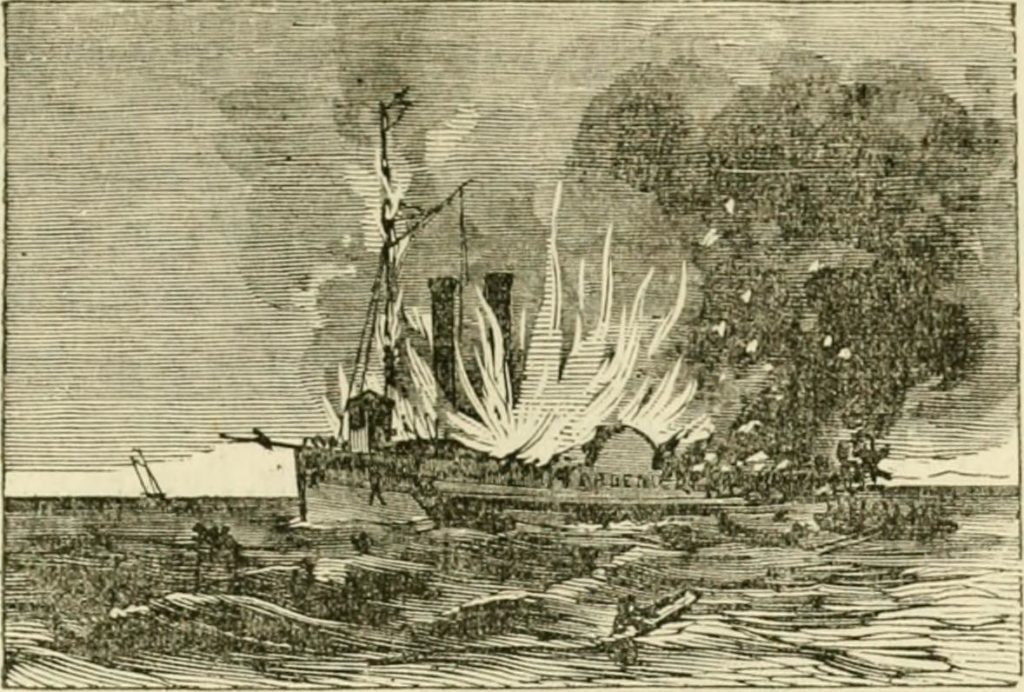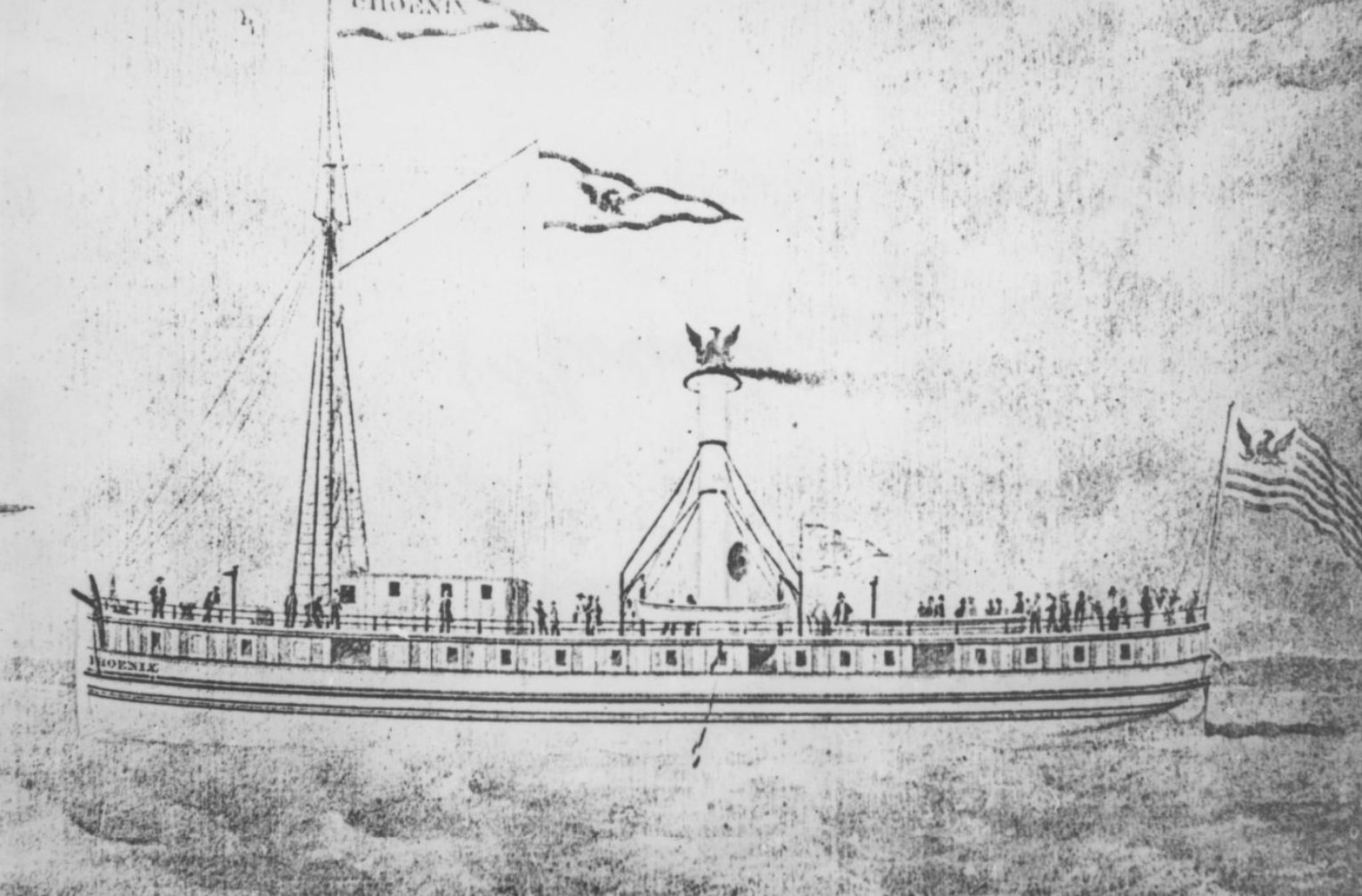“Fire! Fire!”
David Blish awoke with a start. Fire was always dangerous in the 1800s, but out on Lake Michigan, in the dead of night and on a wooden steamship, it could be a death sentence. Footsteps pounded back and forth outside of his cabin door. Scrambling to get dressed, he stumbled out onto the deck and into a nightmare.
David Blish was a successful merchant. He had a family–a wife and kids– waiting for him to return from this business trip. They lived in the boom town of Southport (Kenosha), Wisconsin. There, he had taken advantage of the thriving economy and built a small empire of warehouses and a store. He was well-known around town with a reputation for being honest and helpful. Often, he could be found in his store selling to locals and settlers looking to make a new life.
The western coast of Lake Michigan was bustling in the mid-1800s. Settlers came in droves from Europe and the Eastern United States. They were looking for land and a new beginning in Wisconsin, Illinois, and places farther west. Goods and merchandise followed them, supplying and sustaining the growing population on America’s frontier.
They travelled on schooners, the traditional sailing vessel of the Great Lakes, and also steamships. This newer form of lake transportation was slowly overtaking the shipbuilding industry on the Great Lakes. Belching black smoke while consuming the seemingly inexhaustible forest lands, steamships had the advantage of speed and cargo capacity over the schooners, which made them popular. Shipping lines set up regular routes that plied the waters between Buffalo, NY and Chicago, IL. Along the way, they made stops in eastern Michigan and the east coast of Wisconsin.
David Blish found himself on the SS Phoenix, late in November 1847. She was a good ship, only a few years old, and of a new variety called a “propellor.” The ship made regular trips between Buffalo and Chicago and was often filled with travellers. Her one steam engine sat roughly in the middle of the ship and instead of turning great paddle wheels on either side, she used the new propeller technology sweeping the industry.
This ship was powered by a single boiler that was kept hot by sailors, known as “firemen,” who stoked the fires with cord after cord of wood. The steam then drove two propellers on the same shaft. She also had a mast with sails that could supply additional power or be a lifeline should the engine fail.
David had gone east to conduct business and was now almost home. This night, there were about 250 people on board which included 40 or so crew members and around 180 immigrants, settlers from the Netherlands. Numbers were hard to judge, as people disembarked while others got on the ship at various stops. It was the habit of the shipping companies to pack as many people on board the ship as was practical. More people meant higher profits and accurate numbers were hard to keep.
Life on board the ship in mid-November consisted of cold winds on deck, a cozy cabin, and opportunities to mix and mingle in the public spaces. While David enjoyed his comfortable cabin, many of the immigrants on the ship had booked passage in steerage. This was much more crowded, had far fewer amenities, and was generally considered quarters for poorer people.
By all accounts, Mr. Blish enjoyed spending time with this bunch, whom he referred to as “Strangers from a strange land.” Some told him of their homeland in the Netherlands. Others spoke about a bright future and the prospects of marrying their fiance who was along on the trip, too. Families, with kids in tow, told him about their relief that their 4,000-mile journey, which took nearly 3 months, was coming to a close. Having supplied other immigrants through his business, he respected them and wished them well as they moved into America’s frontier.
David must have felt the anticipation and excitement of his Dutch companions on the deck below. Late in the evening on November 21, he retired to his cabin for a night of sleep, expecting to reach home in the next day or two. As the Phoenix rocked in the gentle swell on the lake, he thought back on what had been, for the most part, an uneventful trip. Only two things stood out.
Earlier in the trip, the captain had a fall and wrenched his knee. When he could no longer stand, he retired to his cabin and his bed. Mr. Watts, the First Mate had taken over command of the ship, and he had kept them out of the worst of the November weather.
David was lulled to sleep by the gentle rocking of the boat and the rhythmic thumping of the engine which could be felt throughout the ship. The engine was a bit louder than normal. The first mate had decided that this night they would leave the safety of Manitowoc Harbor where they had weathered a storm and make the run for Sheboygan, about 25 miles to the south.
Conditions were favorable, despite a stiff breeze and the first mate was driving the ship hard. Mr. Blish had noted, along with other passengers, that a few crew had gone ashore at the last stop and seemed to have enjoyed themselves a little too much in the local taverns. But this was not of his concern. Safe and snug in his cabin, the rhythmic pounding of the engine lulled him to sleep.
It was around 4 AM. when the shouts of “Fire, Fire!” woke him up. David immediately moved to help. Smoke was curling out from under the deck amidship near the boilers and engine. Pumps were being manned and a bucket brigade formed. The familiar scent of burning oak, pleasant in the fireplace, now held menace. Mr. Blish didn’t hesitate to join a bucket brigade and, for a while, it seemed as if the fire might be contained.
For nearly an hour, the fire and the crew battled to see which would live. The shouted commands and responses from the pumpers and bucket brigade were hopeful. Yet, the boat was made of wood, and the fire crept along the ceiling, crackling and flickering its way out of the engine compartment. It found its way into cracks and scorched the bottom of the upper deck. There it gained full life, whooshing into existence as the flames found access to the night air. They burned higher, and brighter, and continued to spread out towards both ends of the ship.
By 4:45 AM, the Phoenix was ablaze. The fire crackled and roared, its heat burning the hair and skin of those who couldn’t get far enough away. It burned so brightly that the Sheboygan, WI beach some five miles distance was lit as if the sun had risen. The few out at that hour couldn’t fail to notice the burning ship and began to rouse the town with a hue and cry to provide assistance. In the harbor, the SS Delaware began to make her way onto the lake to assist.
On board the Phoenix, the reality of the situation dawned on the crew first. This ship would not be saved. The only action they could take was to continue fighting the fire while launching the two lifeboats the ship carried. If the fire could be fought long enough, those boats could make the trip to shore, and hopefully return to save more people.
As the boats were lowered, Mr. Blish remembered the captain, who was unable to move. He went to the captain’s quarters and bundled the man up. He then placed him in one of the lifeboats. Due to his wealth and stature, he was also offered a seat. He declined, stating, “There is work left for me here, and I want to take my chances with the rest.”

The middle of the ship was an inferno, the strong lake winds fanning the flames. The panicked passengers ran for the lifeboats, the mass of people threatening to overturn them. David Blish stood at the gangplank and ensured the lifeboats could pull away from the Phoenix. The two boats could only hold 40 people, and they were full. Those fortunate to find a seat would owe their lives to David. The other 210 men, women and children would have to fend for themselves.
As the boats headed towards shore, David turned back to the bucket brigade that was valiantly trying to control the flames. The only hope was to stay alive until help appeared. Many passengers sensed that their last chance for salvation was slowly rowing away. A pair of young women stood on the rail of the Phoenix and jumped, hoping to land in one of the lifeboats.
One landed in the lifeboat and was caught by scared survivors. The other caught the edge of the boat with her hands and hung on, trying to pull herself up and in. Fearing that she would overturn the boat and drown them all, the crew slowly peeled her hands from the edge, and released her, pleading for help, into the water.
When the SS Delaware finally appeared on the scene, the raging fire proved too big and hot to safely approach to offload trapped passengers. Onboard the Phoenix the smashing and splintering of wood could be heard as men found axes and began to chop anything that could float. The water became littered with doors and planking that had been ripped from the Phoenix to be used as makeshift rafts. Some jumped into the flotsam in an attempt to make it away from the burning ship and closer to the Delaware. The frigid water quickly took the lives of most of those who tried to float to safety.
The crew of the Delaware watched in horror as people on board the burning ship began to make their final choices. Faced with the choking smoke and searing fire, a pair of schoolgirls held hands and jumped into the lake, disappearing together almost immediately. Others, seeking to remain alive as long as possible, climbed the mast and rigging to escape the flames. As the fires moved forward, the sailcloth was set ablaze, trapping and killing those who had fled to the heights.
Back on board the Phoenix, David Blish continued to fight the fires, trying to buy precious time and fervently hoping that help would arrive. He continually encouraged those around him and valiantly kept the bucket brigade going. As he ranged about the ship, trying to coordinate and maintain the firefighting efforts, he came across the various people and families he had previously met and eaten with, their hopes and dreams vivid in his memory.
David knew that their time was running out. Their lives were about to be cut short within sight of land they could not reach, and on a lake that would not extinguish the fires until it had consumed everything above the waterline. He did his best to console these new friends, encouraging and strengthening them to keep fighting against the fate that was soon to come.
Before the sun rose, the fire had cut the ship in two. The bow and stern flanked a blazing middle that no one could pass. The Delaware stood off a little in the distance, helpless to approach the ship. Her crew watched as a family gathered on what little remained of the burning Phoenix. The father threw wood debris into the water to make a raft. Holding their child, the two clasped hands and jumped. They missed their raft and together they splashed into the water and disappeared.
The end was now near, the fires leaving very little space for the people to crowd. More and more jumped rather than burn in the fire. David Blish looked into the water and knew it was his last chance. Near him were two terrified young children. He took them in his arms and jumped. He swam for a raft and clung on to it, holding onto hope and the children.
Eventually, the Phoenix burned to the waterline. The roar of the fire was gradually replaced with the hiss of steam when the flames met water. The desperate cries of the trapped had long faded into the early morning quiet. As the dying fires now posed no threat, the Delaware moved in to look for survivors and found three. One, the only one to escape this way, was using a door as a makeshift raft. Two other men dangled from chains from the aft section of the burned hulk. All told there would be only 43 survivors. Of the settlers from the Netherlands, only 25 survived.
And what of David? Up and over the peaks and down into troughs of the gentle swells of Lake Michigan, David had held on to the floating raft. He held on to those two children. And slowly they disappeared into the darkness, to survive only in the pages of history.


Fantastically written piece of history. Thank you for the journey.
Thank you for reading! Hopefully will have more in the future.
Thank you for telling this history in such a complete and interesting way where many will read and know some of the people and perils that came before us.
Thank you for reading! I think its important that we remember the people that sailed on the Great Lakes.